BY DEBRA KEEFER RAMAGE
From the ridiculous (Moms for Liberty) to the sublime (Notorious D.O.T.)
The school board beat is not usually this tabloid-worthy, but have you all been following the (ahem) “career” of Bridget Ziegler of Sarasota, Florida?
This fine, upstanding lady is married to Christian Ziegler, who was ousted last year as the chair of the Florida Republican Party due to multiple charges of sexual abuse and rape. Mrs. Ziegler is a founder of the Florida Moms for Liberty, a right-wing education pressure group that harasses teachers, students and families about their sexual orientation, censors books and gets people fired. As such, she is also on the school board in Sarasota.
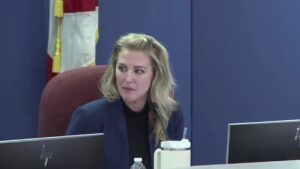
Bridget Ziegler of the Sarasota School Board and Moms for Liberty
Since last December, an overwhelming majority of her community members have been begging her to resign from the school board after she admitted that she had solicited an alleged rape victim of her husband’s and participated in a three-way sex scene with the two of them. She is still hanging in there, maintaining that her personal life has nothing to do with her school board duties. The hypocrisy is breathtaking.
In sharp contrast, there is Dot Heffron, a school board member in Chesterfield County, Virginia. Her story, definitely worth the long read, was picked up by the excellent magazine Bitter Southerner. (Read it here: tinyurl.com/DKRatSSP-2403-BS-Dot.) Tom Lee writes in his article, titled “Activated”:
“Once the province of local good-government advocates, school boards today are swollen by the same red-meat politics of national cable newscasts. As the races became clouded by party-line social issues, the tactics common on the national stage — social media misinformation, partisan redistricting, whispered accusations, and outright harassment — came to the Clover Hill District of Chesterfield County.”

Dot Heffron of the Chesterfield County, Virginia, school board, with her daughter
Heffon’s supporters in the community still call her The Notorious D.O.T., a nickname she earned over a decade ago as a roller derby athlete, long before she got into politics. Right-wing opponents, including a very persistent and dangerous ex-teacher, issue death threats, put up vicious billboards, and file specious legal attacks.
What has she done that made her so threatening to the white male supremacy? She vigorously opposed the district’s initial plans in 2021 to go back to 100% in-person instruction on the eve of a major COVID-19 wave. For that she was attacked by huge billboards at each entrance to the town center.
Even worse, she is also way too woke for some of these guys, having worked openly and tirelessly to solicit engagement from BIPOC families, which account for more than half the enrolled students in her district. Heffron’s old roller derby team, the Derby Demons, was very diverse with all races, ages and sexual orientations. She liked that. So she looked around at the lily-white Protestant upper-middle-class PTA groups and asked, “Where is everybody else?” But Dot Heffron was re-elected to the school board in 2023, despite the massive forces and their war chests opposing her.
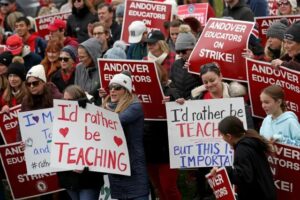
Illegal three-day educators’ strike in Andover, Massachusetts
Labor struggles everywhere, including right here
Another out-of-state story before I turn to Minnesota and MPS comes via Labor Notes from Andover, Massachusetts, a small school district 20 miles north of Boston. Andover is one of the many places in the U.S. where public employees, including educators, have unions but are banned from striking. (The whole state of Minnesota was like this until the famous Minneapolis Federation of Teachers strike in 1970. See Southside Pride’s article of March 2022 at southsidepride.com/2022/03/14/even-if-coordinated-strikes-dont-happen-this-is-historic.) The Andover Education Association had been bargaining for months with no progress when they made the brave decision to have an illegal strike. It lasted just three days before the district caved in to a majority of their demands (that the district had said for months were ”impossible.”) If that doesn’t show the power of the strike, I don’t know what does.
Here in the Twin Cities, the Saint Paul Federation of Educators (SPFE) held a strike authorization vote in February that won by 92%. On Feb. 26, the union set March 11 as their deadline to strike if they don’t get a tentative agreement (TA). As we go to press, it’s hard to tell if the strike will happen, or if there will be a last-minute TA that the membership of SPFE can accept. There are calls from both major cities and many smaller ones for the legislature to come up with more money for teachers and schools, so these impossible labor crises can free school boards to make good change.
Statewide, there is a huge uprising of labor militancy in the education sector, as in other segments of organized and unorganized workers. In an article on Education Minnesota’s website, the organization’s president, Denise Specht, explained what to expect this year and why. The article came out in February, and is titled, “When teachers are chanting, you know it’s time to act.”
Specht said this is what she heard from educators, both in polling data and from face-to-face meetings across the state:
“Their jobs are burning them out. They don’t feel safe at work. Their paychecks don’t go far enough. There aren’t enough adults in the building. The health insurance companies keep gouging them. They won’t make it to the normal retirement age for their pensions.”
Additionally, Specht noted that over half of the locals are working on expired contracts. Even Minneapolis is not spared from labor tensions, despite having had the most recent successful strike just two years ago. Educators in the Minneapolis Federation of Teachers (MFT) have been working under a contract that expired last June.
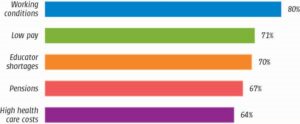
Top five issues for the legislative agenda
Minnesota educators’ legislative agenda and other news
With last year’s “trifecta” legislature, a lot of good progressive legislation passed, some of it related to education, but with so many areas needing attention (and such a short session) inevitably there is some unfinished business.
Education Minnesota’s website is the best place to keep up with educators’ legislative priorities and progress, starting with this pre-session detailed plan for 2024. Informed by a poll taken earlier, including other studies and organizing data, highlights include ending the educator shortage by raising pay, improving health care, and most importantly, improvements in working conditions. The poll results (see graphic) showed working conditions as the top issue educators are concerned about and seeking relief on. Following closely in the top five were low pay, staff shortages, pensions, and high health care costs.
Keeping staffing levels adequate in the future means attracting more students to an education career and on that note, “aspiring educators” (i.e., student teachers) are on the agenda as well. Did you know Education Minnesota has a section for student teachers called Education Minnesota Aspiring Educators (EMAE)? Their part of the legislative agenda includes simply making a student-teaching semester possible for everyone, not just those with independent means or families that can carry them for nearly a year while they prepare for their career. They hope the state will do this by paying a stipend, suspending tuition fees, assigning student teachers geographically so they are near their homes and/or don’t have stupid long commutes, and other common-sense arrangements for the student-teaching semester.
Minnesota Reformer had two recent articles about education in Minnesota. A Jan. 24 piece covered the court judgment where a judge barred the Bemidji school district from further interference in union organizing among its educators. Educators in Bemidji have been without a contract for eight months and are currently in mediation with the school district. The school district illegally interfered with the union by suppressing informational flyering and threatening and disciplining union activists.
And in the Department of the Bleeding Obvious, the Reformer covered a report on Jan. 22 that showed that richer and whiter Twin Cities high schools send more of their graduates to college. Are you shocked? I am shocked.
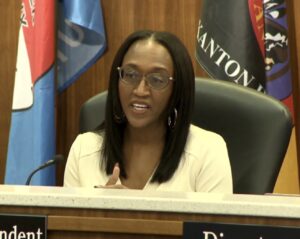
New MPS superintendent Dr. Lisa Sayles-Adams
Minneapolis Public Schools – a new superintendent, class sizes, and school board races
Minneapolis Public Schools finally chose a permanent superintendent. The helm was taken by Dr. Lisa Sayles-Adams in mid-December 2023, and she held her first press conference as superintendent on Feb. 9.
Sayles-Adams (who is the niece of former Minneapolis Mayor Sharon Sayles-Belton) grew up in St. Paul and began her education career as a teacher in MPS. She was promoted to administration and served as principal of City Alternative High School before being lured away in 2004 to an administration job in Georgia. Later returning to Minnesota, she was eventually appointed assistant superintendent at St. Paul Public Schools. Most recently, she was the superintendent of Eastern Carver County Schools.
Sayles-Adams said she felt “hopeful,” as did many of the stakeholders she had spoken with. Acknowledging the many challenges currently facing the district – decreasing enrollment, increasing debt, and that expired contract yet to be resolved – she pledged to spend her next 100 days in the job meeting with students, families, staff and other stakeholders to form an ambitious plan for the future.
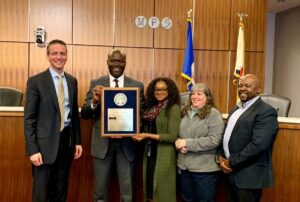
MPS CFO Ibrahima Diop shown holding award for budget excellence in 2019
Later that week, Sayles-Adams presided over her first MPS board meeting, which was interrupted by a serial disrupter who was expelled. At this meeting, a major and sobering report on the budget crisis was given by CFO Ibrahima Diop (who, incidentally, is an award-winning budget genius, and we just wanted to pause to acknowledge that) where he laid out the implications of federal aid expiring in September. See tinyurl.com/DKRatSSP-2403-MPSbdFeb24 for more.
With school board races on the electoral calendar this year, this is another area of education activism you might want to keep your eye on. If you’re in Minneapolis, one or two school board candidates will be on your ballot on Nov. 5. The MPS board seats up for reelection are in subdistricts 2, 4 and 6 of the Minneapolis school district, plus one of the at-large seats. As for DFL endorsement, there will be a school-board-only Minneapolis endorsing convention on Sunday, April 21, at Washburn High School.
Current president of the MFT teachers’ section, Greta Callahan, has announced a run for the Minneapolis school board as the representative for District 6, after incumbent Ira Jourdain said he would not seek reelection. (Jourdain is quitting to run for the state House seat 62B.) This will in turn trigger an election for a new teachers’ section president in MFT. (You can keep track of the leadership of MFT’s two chapters at mft59.org/mft-leadership, and the current school board members at mpsschools.org.) Official candidate filings for the school board race open May 21. MFT may be endorsing a slate, as they did quite successfully in 2022.
Minneapolis Voices is the online newsletter of the Minneapolis Public Schools. They had an interesting article about class sizes in elementary grades, showing that class sizes are now quite low, even lower than caps implemented a few years ago, averaging about 22 students per class across grades.
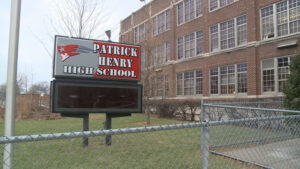
Patrick Henry High School will become Camden High School in June
In other interesting MPS news, students and the community voted to change the name of Patrick Henry High School to Camden High School. The change will take effect in June. The process has been going on for several years now, as I know we reported on it before when it was in its initial campaign phase. Henry High School is a majority African American high school in the Camden neighborhood of North Minneapolis, and students learned, to their horror, that “give-me-liberty-or-give-me-death” Henry was a major slaveholder in Virginia, the state with the second largest number of enslaved people ever in all of American history.
The political landscape: revisiting John Dewey and teaching democracy
A new edition of John Dewey’s masterwork, “Democracy and Education,” edited by Nicholas Tampio, was issued this month. MinnPost had an article in January interviewing Tampio and getting his views of Dewey’s philosophy of education and its continuing relevance today.
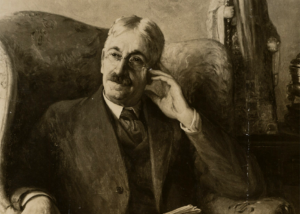
Early 20th-century philosopher John Dewey
Although indisputably a towering figure in education philosophy, Dewey’s scholarship is often misunderstood, misinterpreted and misused. Opponents of “educational reform” involving racist ability tracking and overuse of standardized tests often don’t recognize him as a resource and a forefather. He has been accused of wanting to make students into “good widget makers,” ironically because of his prescient philosophy of what we might now call whole body learning. He wanted kids to use their hands and bodies to learn and grow, rather than just using their ears, voices and brains to repeat memorized “facts.” He was ahead of his time, and our time needs his insights.
One way to look at the current culture wars is to ask, “What is each side trying to inculcate in students?” I would argue that censoring history, re-segregating schools 60 years after we struggled to desegregate them, dictating standard gender roles, and teaching to standardized tests are all part of a plan to produce student compliance with status quo authority, which is the opposite of teaching democracy.
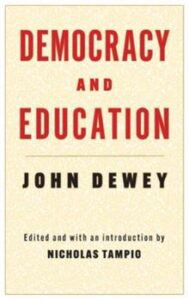 An article I read recently traces the origin of the educational culture wars in the U.S. back to 1975 and a report by the shadowy and scary Trilateral Commission called “The Crisis of Democracy.” That title makes it sound like they were worried that schools were restricting democracy, doesn’t it? But guess what? The crisis was that there was too much democracy, and it was all because of these liberal teachers teaching kids to think for themselves.
An article I read recently traces the origin of the educational culture wars in the U.S. back to 1975 and a report by the shadowy and scary Trilateral Commission called “The Crisis of Democracy.” That title makes it sound like they were worried that schools were restricting democracy, doesn’t it? But guess what? The crisis was that there was too much democracy, and it was all because of these liberal teachers teaching kids to think for themselves.
“[The report] noted that ‘previously passive or unorganized groups in the population’ that ‘became organized and mobilized in new ways to achieve what they considered to be their appropriate share of the action and of the rewards’ were a threat to the smooth functioning of our democracy, which depended on ‘some measure of apathy and noninvolvement.’ Huntington faulted the schools for not pacifying those groups. What followed was the ‘back to basics’ movement.” You can read the entire article, titled “The Path to ‘An Excess of Democracy’” at https://portside.org/2024-01-06/path-excess-democracy.
For now, parents, teachers and communities are managing to hold the line against the ideological heirs of the “back to basics” movement. But just barely. And it’s not just back-to-basics anymore, it’s also no child left behind, school choice supremacy, school vouchers, the war on critical race theory, the school-to-prison pipeline, insane levels of testing, book censorship, defunding arts and leaving nonprofits to pick up the slack, nutty history theories, and Moms for Liberty.
Oh yeah, and crazy men with rifles and active-shooter drills. Combating all this nonsense will involve high-powered activism in school board and legislative races, strengthening and supporting educators’ unions, and lots of countering false propaganda about education.






















